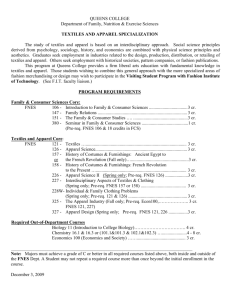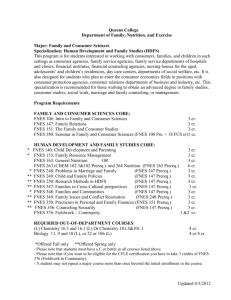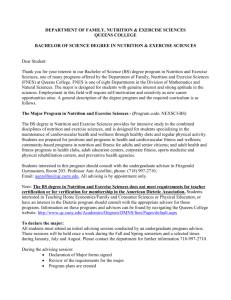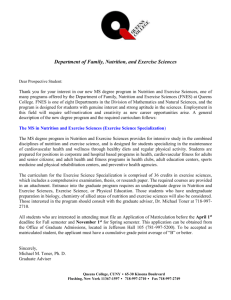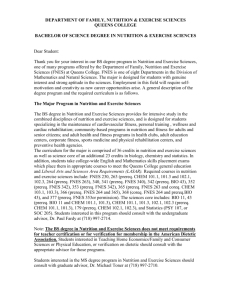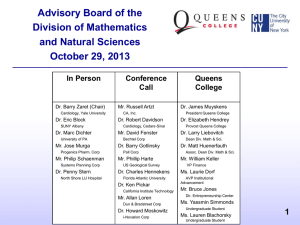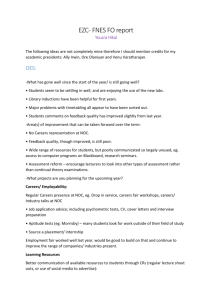Queens College Physical Education Major: Course Requirements
advertisement
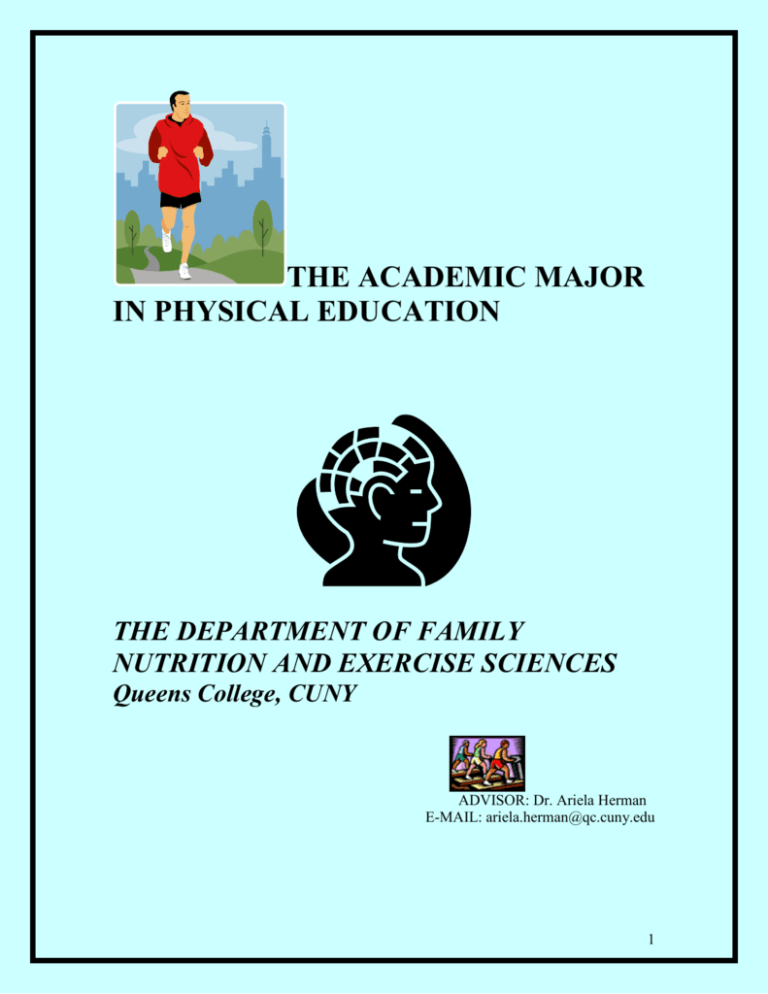
THE ACADEMIC MAJOR IN PHYSICAL EDUCATION THE DEPARTMENT OF FAMILY NUTRITION AND EXERCISE SCIENCES Queens College, CUNY ADVISOR: Dr. Ariela Herman E-MAIL: ariela.herman@qc.cuny.edu 1 Queens College of the City University of New York Department of Family, Nutrition, and Exercise Sciences The Academic Program in Physical Education The Department of Family, Nutrition, and Exercise Sciences offers programs in Family and Consumer Sciences, Nutrition and Exercise Sciences, and Physical Education with several specializations under those programs. The academic program in physical education prepares individuals for a Bachelor of Science degree and for service as teachers in physical education. It leads to a New York State Initial Certificate for teaching physical education for pre-kindergarten through grade 12. In February of 2005, this program received National Recognition from NASPE/NCATE for meeting their standards for initial certification. The faculty is nationally and internationally known in the areas of pedagogy, sport, exercise, and human movement sciences. In addition to the academic programs offered, the department sponsors two collaborative projects with schools in the New York City area. Project SCOPE is a comprehensive partnership program between school practitioners and college faculty aimed at improving school curriculum and professional education in physical education. Project PATH is a collaborative effort between schools and the College to improve the health-fitness status of adolescents and young adults. Both projects have received national and international recognition. Opportunities for advanced studies in exercise science, nutrition, and curriculum and teaching are offered through the Masters of Science in Education degree program (see graduate catalogue for descriptions). Department Chair Elizabeth Lowe, Ph.D., University of Illinois Faculty in Physical Education Paul Fardy, Ph.D., University of Illinois Ariela Herman, Ed.D., Teachers College- Columbia University John Magel, Ph.D., University of Michigan Michael Toner, Ph.D., Ohio State University Henry Wang, Ph.D., University of Georgia Adjunct Faculty in Physical Education Ann Azzollini, M.S., Queens College Suzanne Boehmcke, M.S. Adelphi University Frank Brady, Ed.D., New York University Paul DeCurtis, M.S., Queens College Harry Hoehn, Ed.D., Columbia University Robert Hoover, Ed.D., Columbia University Alan Landes, M.S. Hunter College Christopher Lee, MS in ED- Queens College Tom Lemonda, M.S., Queens College Robin Osborne, M.F.A., University of California @ Irvine David Wiener, M.S., Brooklyn College 2 SCOPE Field Associates Laurie Cappiello, St. Francis Preparatory School Karen Cassandro, Queens High School for Teaching Jacques Ertel, Robert F. Kennedy Middle School (250) Robin Figelman, Townsend Harris High School Lisa Kennedy, P.S. 207 Xenos Novoa, St. Francis Preparatory School Deborah Russo-DeStefano, P.S. 207 Roger Telsey, Great Neck South Middle School John Tsolekas, Cardozo High School The New Physical Education The academic program in physical education represents a shift in direction and a change in course content that is more appropriate to fulfilling the needs of students preparing to be teachers of physical education for grades pre-kindergarten through twelve. Today, the areas of "health," "fitness," and "wellness," have assumed a more prominent position on the agenda for the Nation's adult citizens as well as for the youth of America. Physical education has a greater emphasis on fitness and motor competence for ensuring a healthy and active lifestyle for youngsters and adults. The educational experiences that foster motor development, fitness, and proficiency in sport performances are woven into the preK-12 grade school curriculum. These goals and experiences also form the educational areas from which the professional teacher is prepared. The teacher education program in physical education is designed to prepare individuals to assume professional roles in a variety of educational and school settings, which engender the diverse cultural and ethnic make-up of urban and suburban communities. The new roles are that of movement specialists in the primary grades, and instructors of sports, skills, and lifetime activities in the middle and upper grades. Course experiences are designed to ensure that performance competencies compatible with these roles are achieved. In addition, higher academic requirements are identified to ensure standards of excellence for individuals who will be certified through this program to teach physical education in New York State in the 21st century. Students who major in physical education engage in an academically rigorous program. The program includes practical field experiences in schools that culminate with a semester of student teaching in elementary and secondary schools. Students go through a series of course experiences that require them to develop the goals necessary for teaching pre K-12 children . The academic program in physical education in content and structure includes: 1. higher requirements and standards for the major program 2. higher academic requirements and professional standards for entering and maintaining status in the professional education component of the program 3. the design of sequentially ordered course experiences and "blocks" of courses that adequately prepare individuals to achieve the ultimate goals 3 and competencies of the program. They also foster more social-academic interactions among groups of students majoring in physical education 4. a closer collaboration with schools and partnerships with school practitioners who are members of Project SCOPE (School-College Operation in Physical Education) 5. the design of carefully planned clinical course experiences that facilitate a more experiential and knowledge based type of professional education 4 Course Requirements and Suggested Sequence The following courses are required of physical education majors: Physical and Biological Sciences (12 credits) Biology 11 (LASAR) Chemistry101.1 & 101.3 (LASAR) Biology 43 (Prereq.: Biology 11 and Chemistry 101.1, 101.3) Note: The above courses, with the exception of Biology 43, will satisfy LASAR requirements. Human Movement Studies (22 credits) FNES 143 FNES 146 FNES 160 FNES 230 FNES 235 FNES 253 FNES 342 FNES 343 Workshop in Fundamental Motor Skills Sport Skill Analysis (prereq: Fnes 143) Principles and Foundations of Physical Education Exercise, Energy Balance, and Weight Control Analysis of Human Movement (pregreq: Bio 43) Psychology of Sport Physiology of Muscular Activity (prereq.: Chem 101.1, 101.3 and Biol 43) Motor Learning and Performance Movement Performance (8 credits) FNES 10 FNES 12 FNES 12 FNES 12 FNES 12 FNES 13 FNES 14 FNES 14 Assessment and PE Standards Team Sports: Volleyball Team Sports: Basketball Team Sports: Softball Team Sports: Soccer Folk Dance Individual/Dual Sports Tumbling Individual/Dual Sports Tennis Advanced Movement Performance (4 credits) FNES 212 FNES 214 FNES 311 Teaching and assessment of team activities Teaching and assessment of individual/dual activities Physical Fitness and Training Programs 5 One course from the following: Psychology 107 (LASAR) Sociology 205 (LASAR) Physical Education Pedagogy (15 credits) FNES 161W Introduction to Teaching Physical Education FNES 266 Physical Education - PreK - Elementary School Levels (prereq.: FNES 160 and 161) FNES 369 Methods for Teaching Physical Education (FNES 161, 266) This course may only be taken the semester directly prior to FNES 379 FNES 379 Student Teaching in Physical Education (prereq: FNES 369) (prereq.: SEYS and EECE courses with B average) Completion of all incomplete + below minimum grades Education (15 credits) SEYS 201 Historical, Social and Philosophical Foundations of Education SEYS 221 Development and Learning in Middle Childhood and Adolescence EECE 310 Children in Cultural Contexts I: Child Development SEYS 350 Cognition, Technology, and Instruction for Diverse Learners EECE 340 The Early Development of Language and Literacy, or SEYS 340 Language, Literacy and Culture in Education 6 Department of Family, Nutrition, and Exercise Sciences Queens College of City University of New York Undergraduate Physical Education Majors Information for Transfer Students A. Recommended courses to be taken in the first semester: FALL START FNES 160 FNES 253 SEYS 201/221 Chem 101.1, 101.3 and Bio 11 Bio 43 (if Bio 11 and Chem 101.1, 101.3 are satisfied) Soc 205, Psy 107 FNES 230 LASAR courses SPRING START FNES 160 FNES 230 SEYS 201/221 Bio 11 or Chem 101.1 & 101.3 Sco 205, Psy 107 FNES 342 (If Bio 43 is completed) LASAR courses B. Please also make note of the following: 1. Make sure all LASAR courses are completed. If they are not, register for LASAR course (s). For advisement on LASAR courses, go to the office of academic advisement, Kiely Hall 217, 718-997-5599. The department does not advise students regarding the College requirements. 2. FNES 161W, 266, and 369 are not transferable from another institution, except when prior approval is given by the coordinator of Physical Education Teacher Education. 3. May not take the following courses in the first semester: FNES 143, 266, 369, 379 7 4. Declare the academic major (see secretary for details). Plan to see the coordinator of the Teacher Preparation program of Physical Education early in the first semester. Office of Physical Education and Exercise Science Fitzgerald Gymnasium, room 203, 718-997-2710 Ms. Krystle Holder- krystle.holder@qc.cuny.edu Mrs. Alyson Tse- alyson.tse@qc.cuny.edu 8 Sequence of Courses- Transfer Students - completed college requirements This does not include basketball, volleyball, soccer, softball, tennis, tumbling and folk dance FIRST SUMMER SESSION – FNES 10 First Second FNES 160 FNES 230 FNES 343 Bio 43 SEYS 201W FNES 161W FNES 235 FNES 342 SEYS 221 EECE 310W Third FNES 143 FNES 266 FNES 214 *FNES 253(In Fall) FNES 311 SEYS 350 Fourth FNES 369 FNES 146 EECE/SEYS 340 FNES 212 *Statistics Fifth FNES 379 This assumes student has taken Biology 11 and Chemistry 101.1, 101.3 During the summer sessions students may take any activity courses (except courses listed as beginner courses), education courses, and FNES 253. Activities to be placed during any semester. However- Basketball, Soccer, Softball must be taken prior to FNES 212, Tennis and Volleyball prior to 214. 9 Year One ( or Previous Institution) Fall Semester Biology 11 4 Basketball 1 Tumbling 1 Humanities II 3 Social Science 3 English 110 3 Elective 3 Spring Semester Chemistry 101.1, 101.3 Softball Tennis Dance Humanities III Social Science English 120 or W course Total………………………..…18 Total………………………………… 16 Year Two Fall Semester Biology 43 FNES 160 FNES 230 FNES 343 SEYS 201 Volleyball Spring Semester FNES 161W FNES 235 FNES 342 SEYS 221 Soccer Swimming Humanities I, Tier I 4 3 3 3 3 1 4 1 1 1 3 3 3 3 3 3 3 1 1 3 Total………………………....17 Total………………………………… 17 Year Three Fall Semester FNES 143 FNES266 FNES 311 FNES 253 EECE 310 Humanities I, Tier II Spring Semester FNES 146 SEYS 350 Statistics FNES 212 Pre-Industrial/N. West Civil. Elective 1 3 2 3 3 3 3 3 3 1 3 3 Total……………………………….16 Total………….......................15 10 Last Status First A ID M1 FNES 12 FNES 12 Volleyball Basketball FNES 12 FNES 12 Softball Soccer E 0000 Credits 1 1 Updated 2/15/2007 Record New Major Grade 12/9/2003 082 Grade 1 1 Dance 1 Tennis 1 Tumbling 1 Swimming 1 Phys Fitn & FNES 311 Prgm 2 FNES 212 Team Sport Act 1 FNES 214 Ind Sport Act 1 Number of Movement Credits Completed Average Grade for 7/11 courses (3.0 Req.) Average Grade Movement Courses M4 Chem 101.1 101.3 1 1 1 1 Spring 07 - Legend RC-Repeat (or To Take) Course Avg-Average below required Warning- deficiency; must satisfy before graduation A active I inactive D dropped major E entry M midpoint G graduate 1 1 1 0 0.00 0.00 M1 1 3 3 3 3 3 3 3 Warning RC&Avg 1 1 1 1 1 1 1 1 0.00 M2 M3 ENGL 110 3 FNES 161 W 3 Average Writing Courses (2.67 Req) Academic Adviser To Take Reason 1 1 1 1 FNES 13 FNES 14 FNES 14 FNES 15 M2 FNES 143 Fund Mt Sk FNES 146 Sport Sk A FNES 160 Fnd Phy Ed FNES 230 Ex En B Wt FNES 235 Movmt Anal FNES 253 Psych Spt FNES 342 Physiol MA FNES 343 Motor Learn Avg Grade for M2 (2.00 req.) Entering Semester Graduating Semester Warning C or better C or better B or better C or better C or better C or better C or better C or better RC&Avg 1 1 0.00 M3 Warning Basic Chemistry Chemistry Lab 1 3 1 Bio 11 Intro Bio Bio 11 Intro Bio Lab Bio 43 Anat & Physiol Soc 205 or Psy 107 Stats 3 1 4 3 1 1 1 1 B- or better RC&Avg C- or better C-or better Must pass with letter grade Must pass with letter grade Must pass with letter grade 11 M4 M5 FNES 161W FNES 266 FNES 369 EECE 310W SEYS 201W SEYS 221 SE/EE 340 Warning Pedagogy Courses Intro Teach PE Elem Methods 3 3 3 1 1 1 Child Cult: Dev 3 1 Fnd Ed 3 Dev Learn 3 Lang Literacy 3 Cogn Tech & SEYS 350 Div 3 Number of Pedagogy Credits Completed SE&EE Courses Average (3.0 Req) Pedagogy Courses Average 1 1 1 M6 FNES 379 GPA RC Student Teach B or better B or better 1 0 0.00 0.00 M5 Warning RC&Avg M6 1 Warning RC 6 0.00 Program Completion No Revised: July 16, 2009 12
